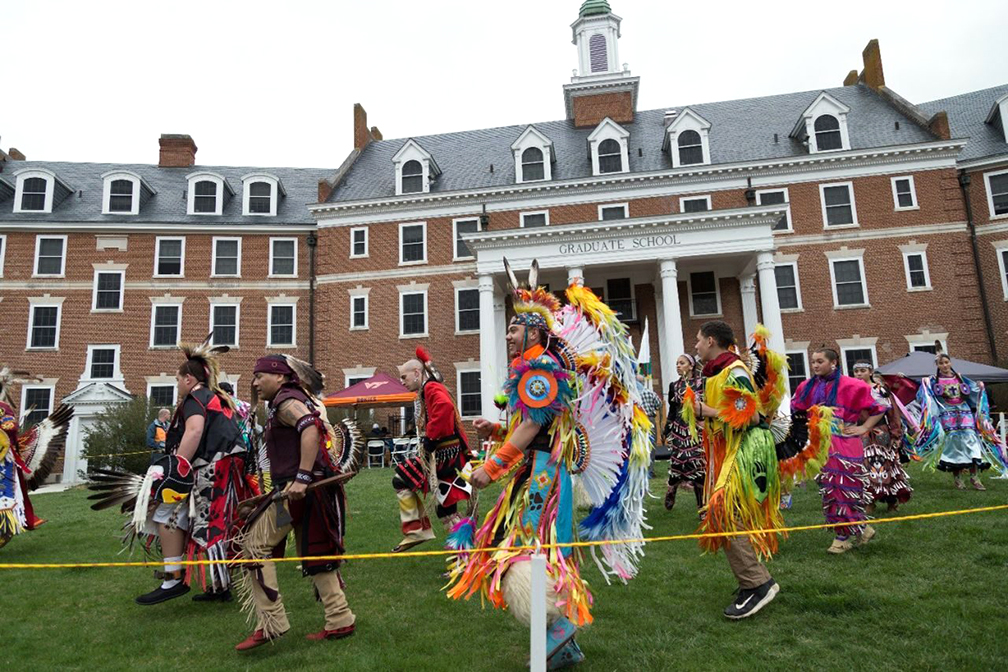Powwow Returns to Virginia Tech for Second Year
March 27, 2018

A traditional Native American celebration returns to Virginia Tech for the second year on March 31.
The Spring 2018 Powwow will be held on the lawn of the Graduate Life Center from noon to 6 p.m.
The intertribal powwow, a free event organized by Native at VT, a student organization, will feature songs, drum performances, and dancing, along with vendors selling arts, crafts, jewelry, and more.
Since last fall, student members of Native at VT have been planning the powwow, a ceremony that celebrates Native American culture and intends to increase awareness of indigenous students at Virginia Tech.
“A lot of times that population is thought to exist only in the past,” said Melissa Faircloth, advisor for Native at VT, which has about 15 student members. “A lot of people aren’t really aware of the native students population on Tech’s campus. This helps to increase their visibility on campus.”
American Indian students are one of the smallest minority groups at Virginia Tech. There are 48 American Indian or Alaska Native undergraduate, graduate, and professional students, according to the university’s 2017–2018 enrollment profile.
The powwow is an opportunity to bring the campus and Blacksburg communities together to learn about Native American culture, Faircloth said.
“It gives you pride. You are represented,” said Jason Chavez, a junior majoring in political science and a member of Native at VT, about the powwow. Chavez, who helped with last year’s powwow, is a member of the Tohono O’odham Nation in Arizona.
Last year’s powwow drew some Native American tribes from Virginia. This Friday, the university’s Office for Inclusion and Diversity is organizing special campus tours and academic information sessions for high schoolers from the Monacan Indian Nation, a tribe in Amherst County, Virginia. Many of the students will stay for the powwow the next day.
In January, some student members of Native at VT and university faculty and staff visited the Monacan Nation’s headquarters and spoke with high schoolers about college life. Virginia Tech’s land once belonged to the Monacans.
“The goal is to continue to nurture meaningful relationships with Monacan youth, to share the many ways of knowing at Virginia Tech, and to encourage them to join Virginia Tech for their collegiate education,” said Mercedes Ramirez Fernandez, associate vice provost for strategic affairs and diversity at Virginia Tech’s Office for Inclusion and Diversity.
Two drum groups will perform during the powwow. Thunder Voice, a Northern drum group, will perform its signature higher-pitch music, while Southern Sun, a Southern drum group, will feature a lower-pitch sound.
Native at VT students will sell T-shirts that they designed for $10.
Last year, Faircloth, a Ph.D. student in the Department of Sociology, organized the first powwow as her Diversity Scholars project. Diversity scholars create projects at the university that enhance equity, diversity, and inclusion within the Graduate School and throughout campus.
Caylin Stewart, a senior majoring in agricultural sciences and a member of Native at VT, is co-chair of the powwow. She is a member of the Chickahominy Tribe in Virginia. Also, Sarah Woodward, a project support technician in the Pamplin College of Business Department of Management, has helped Native at VT navigate logistical and administrative processes on campus when planning for the powwow.
“Planning for this event has provided me the opportunity to share my expertise with my community in a way that helps brings awareness to Native American culture and for that I am very thankful,” said Woodward, who is a member of the Osage Nation in Oklahoma.
Faircloth grew up attending powwows for her own tribe, the Coharie Tribe in North Carolina. Her alma mater, East Carolina University in North Carolina, hosts an annual powwow. She hopes that Virginia Tech’s powwow will continue as an annual celebration for many years.
“It’s allowed me to fill a gap and be a part of a legacy that was started at Virginia Tech,” Faircloth said.
Please observe the following etiquette tips, shared by powwow organizers:
- Listen to the emcees. They will provide direction at all times (when it is appropriate to remove hats and caps, when photos are not allowed, etc.).
- Dress respectfully. Avoid revealing attire, costumes, or headdresses.
- Do not touch the dancers or their regalia.
- Ask before you take a photo of individuals outside the arena and never enter the dance arena for a photo. Remember to listen to the emcee to learn when photos are allowed.
- Feel free to talk (at appropriate times) with those around you. Ask about what you don’t understand. Many will be eager to share and explain their indigenous culture and knowledge.
Written by Jenny Kincaid Boone







